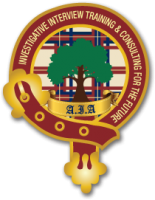
Program Overview
This advanced block of instruction equips investigative professionals—analysts, auditors, evaluators, fraud examiners, investigators, and inspectors—with the skills to effectively respond to questions posed by subjects, victims, and witnesses during interviews. Rather than viewing interviewee questions as interruptions or challenges, participants will learn to treat them as strategic opportunities to reinforce credibility, sustain rapport, and guide the interview toward truth-relevant disclosures.
Grounded in science-based interviewing methodology, the course emphasizes cognitive and strategic principles that support ethical engagement, including the Time Responsibility Continuum—a proprietary framework developed by Mark Anderson. This continuum helps interviewers assess when and how to respond to interviewee questions based on timing, investigative goals, and the interviewee’s psychological state. Participants will learn to balance responsiveness with control, ensuring that answers are appropriate, purposeful, and conducive to continued cooperation.
Science-Based Interviewing
Integration
The course draws on key principles from contemporary interviewing science, including:
- Strategic Use of Evidence (SUE): Maintaining control of known facts while managing interviewee expectations.
- Cognitive Load Management: Responding in ways that preserve mental bandwidth for recall and disclosure.
- Rapport and Responsiveness: Using answers to build trust without compromising investigative integrity.
- Time Responsibility Continuum: A structured approach to deciding when and how to answer interviewee questions based on timing, relevance, and strategic impact.


Course Objectives
By the end of this block, participants will be able to:
- Recognize the strategic value of interviewee questions in investigative interviews.
- Apply the Time Responsibility Continuum to determine appropriate response timing and content.
- Deliver responses that maintain rapport and encourage continued cooperation.
- Avoid common pitfalls that derail interviews or compromise investigative goals.
- Integrate science-based interviewing principles to enhance truthfulness and reduce contamination.
- Tailor responses to the role and context of the interviewee—whether subject, victim, or witness.
Testimonials



FAQ
ask us anything
1. What is Anderson Investigative Associates (AIA)?
Anderson Investigative Associates (AIA) is a professional training organization specializing in customized, science-based interview and investigative training for organizations across law enforcement, corporate, audit, human resources, and inspection sectors.
2. What types of training services does AIA offer?
AIA offers training in human resources interviewing, investigative interviewing, audit/inspection/evaluation, leadership and communication, trauma-informed interviewing, cognitive interviewing, evidence collection techniques, and more — all customized to client needs.
3. What does “science-based interviewing” mean?
Science-based interviewing refers to methodologies rooted in cognitive psychology and behavioral science research that improve information accuracy, reduce investigative bias, and enhance the quality of interviews and investigations.
4. Who should attend AIA training programs?
AIA’s training is designed for professionals in law enforcement, auditing, internal investigations, human resources, corporate security, inspection, evaluation, and other roles where effective information gathering and interviewing are critical.
5. Are AIA’s training programs customizable?
Yes. AIA specializes in fully customized training solutions tailored to an organization’s specific operational requirements, training gaps, culture, and investigative challenges.
6. How is AIA’s training delivered?
Training can be structured in various formats — from one-day workshops to multi-day immersive courses — and includes interactive exercises, realistic scenarios, and hands-on practice.
7. What are some specific courses offered by AIA?
Some courses include Cognitive Interviewing, Counter-Interrogation Strategies, Science-Based Rapport Building, Strategic Interview Planning, Evidence Disclosure and Strategic Empathy, and Advanced Trauma-Informed Interviewing.
8. Why is science-based training important in investigations and interviews?
Science-based approaches improve investigative outcomes by maximizing the reliability and accuracy of information obtained, minimizing bias, and creating defensible methods suitable for legal and professional scrutiny.
9. Can AIA training help with HR investigations and interviews?
Yes. AIA provides training tailored to human resources professionals for employee interviews, misconduct investigations, conflict resolution, and documentation practices that align with legal and organizational standards.
10. How can I contact Anderson Investigative Associates for training inquiries?
You can contact AIA through their website’s Contact page or by calling their office number provided on the site.

